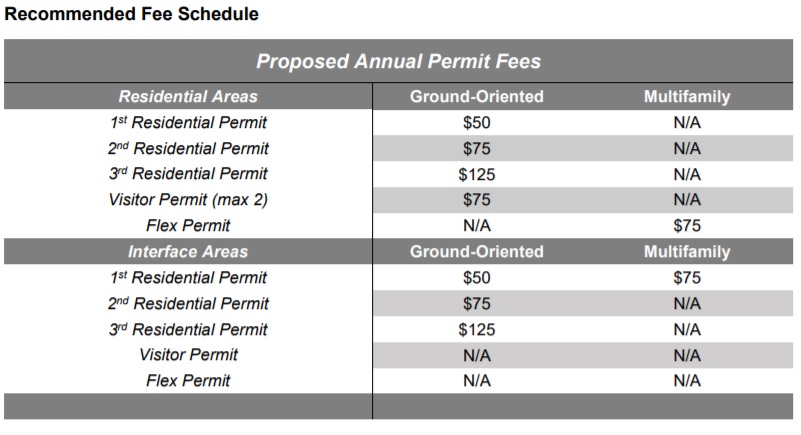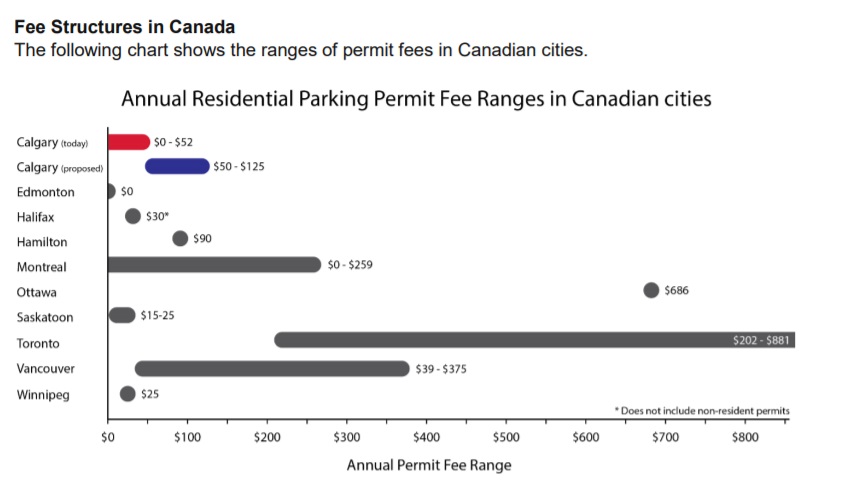A city committee approved a shift towards a user-pay model for residential parking permits in Calgary.

On Wednesday, the standing policy committee on transportation and transit agreed with a recommendation from administration to issue the parking permits for a fee on a sliding scale.
If approved by council, the change would be phased in during 2022 following an amendment to the Calgary Parking Bylaw, and achieves two things.
“One is to cut red tape and make us more responsive,” Doug Morgan, acting general manager of the city’s transportation department, told the committee. “It also seeks to reduce the tax burden and shift the fees over to the users and those that are benefiting from the service.”
Proposed fees range from $50 for the first permit to $125 for the third. Currently, the first two permits are free.
Ward 6 councillor Jeff Davison said this brings street parking closer in line with other neighbourhoods in the city.
“And that’s really the bigger question here, is that if you want to be able to park in front of your house, you absolutely can,” Davison said. “If you want to guarantee that you can park in front of your house — in a certain spot — well, that’s a user-pay model.

Get daily National news
“So why are the citizens of Calgary subsidizing people who specifically want to know that parking is ‘locked and loaded’ for them?”
Running the residential parking program costs the city $1.37 million, including $311,000 in lost revenues — areas administration said should be changed to paid parking. Current revenue for permits totals $101,000 and when combined with fines results in a net loss.
Under the proposed changes, the program would cost the city $1.08 million and would be revenue neutral, with the final decision on any surplus revenues resting with council.
The recommendations come following consultations and open houses with businesses and residents.
The city’s administration said the changes would free up parking in some neighbourhoods.

“Because there’s very little data used at the block level, many neighbourhoods have tended towards a higher level of parking restriction than is needed to address the issues that they see,” Robert White, a Calgary parking strategist, told the committee.
There are 80 neighbourhoods throughout Calgary that currently require residential parking permits, some dating back to 1974 when areas around downtown were serving as de facto overflow parking.
Communities went to the city asking for residential parking restrictions to be put in place to discourage extraneous parking in the area and allow for homeowners to have some space on the street to park.
Ward 9 councillor Gian-Carlo Carra said this will likely reduce the size and number of areas with residential parking restrictions when residents “do a gut check.”
“They’re like, ‘This is a service I’ve been getting for free,’” Carra told the committee. “It’s been costing the city — the taxpayer — a lot of money and a lot of other costs, like driving around needlessly.
“You’re going to see the market respond.”
City council is due to make a decision on the proposed changes at its Nov. 2 meeting.
“When this comes to council, we’ll obviously have a big conversation around what the fee schedule will look like,” Davison said. “But I think what it also does is it really forces people to look at whether or not they actually want this residential parking permit in place.”
The committee also agreed to the phasing out of the “CBZ” parking area in Eau Claire, created in 1997 to facilitate the transition from on-street parking during a time of growth. The city’s administration wrote that the zone no longer fits council’s guidance on parking.
And the committee approved adding paid parking to the Brittania area along Elbow Drive at 49 and 50 Avenue S.W. An administration report showed parking in the area is consistently within 90 per cent of capacity between 2018 and 2020. The timeline for adding paid parking to the area is yet to be determined.
- Alberta RCMP issue nearly 1,000 tickets to drivers over the holidays
- Nicolaides petition 10K signatures short as 1st deadline looms in flurry of Alberta recalls
- WestJet passenger says he was ‘fat-shamed’ by staff on flight to Mexico
- Calgary woman charged after tossing traffic cone off downtown apartment balcony














Comments